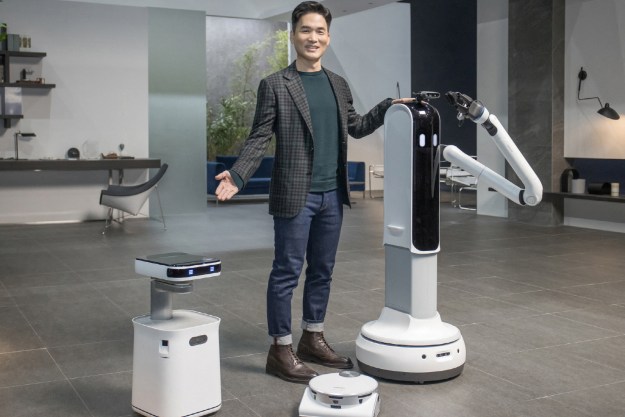What was the coolest Lego structure you’ve ever pieced together? Was it perhaps a replica of a Kwik-E-Mart, or possibly a to-scale model of the iconic Death Star? What about a functional exoskeleton suit capable of wirelessly controlling a robot? Yeah us either, but a robotics expert named Danny Benedettelli just accomplished this very feat and took to YouTube to show off his creation.
Called the Cyclops MK II, Benedettelli’s brilliant invention utilizes Lego’s customizable robotics kit called Mindstorms NXT, and operates via a compatible Android smartphone application. For the exosuit — which itself is almost entirely comprised of Legos — Benedettelli outfitted it with the capability to connect with the MK II through Bluetooth, and attached an Arduino circuit board on the back to transmit movement signals. The exosuit also houses a series of potentiometers which encompass each degree-of-freedom the robot is outfitted with, allowing the robot to completely mimic any move made by Danny.

If this seems like something you’ve seen before, you aren’t wrong. Benedettelli first debuted his Cyclops project nearly four years ago at the 2012 Saudi Aramco Cultural Program, showing off the bigger — yet still incredibly responsive — MK I. It was during this time that Benedettelli worked as an external programmer for LEGO Education as a developer of Lego Mindstorms EV3’s software. Needless to say, the dude knows a thing or two about robotics and Legos.
After displaying the MK I at the show, Benedettelli went back to the drawing board to create the MK II, intending to give it a more humanoid look. Today, the finished product — which he says is still just a prototype — looks a lot less like a crate with legs, and something a bit more similar to a typical biped robot. Benedettelli says he continues to test and develop his unique robot, and plans to implement a mechanism to allow it to walk and use its hands soon.
Even for what Benedettelli deems a “prototype,” the MK II appears to be an imaginative and novel approach to modern robotics. Considering his incredible background working within the industry — not to mention his ingenious use of Legos — we can only imagine what’s in store for the MK III.
Editors' Recommendations
- Watch Boston Dynamics’ dog-like robot don a dog suit and dance
- Watch this robot peel a banana without slipping up
- Watch Elon Musk unveil Tesla’s advanced humanoid robot
- Watch Xiaomi’s first video featuring its robotic CyberDog
- Watch seven Boston Dynamics’ Spot robots strut their stuff in dance routine


